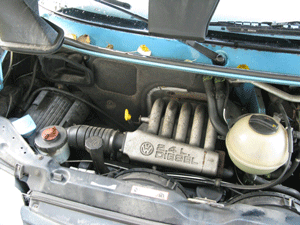Diesel Engines
and Biodiesel Compatibility
Search this site!
Biodiesel compatibility ranks highly with the older diesel engines, unfortunately, there have been some
problems reported with the modern direct injection.
Also, a few people have experienced clogging due to improper storage of the fuel.

Benefits of Running Biodiesel:
The older indirect injection models, which run at lower temperatures, tend to run very well with biodiesel!
In fact, biodiesel works as a solvent and will clean out the deposits left from running petrodiesel.
Photograph courtesy of Leo-setä
Biodiesel increases the life of the vehicle through its lubricating properties, and it has a higher
cetane rating
than petrodiesel.
Problems with Biodiesel Compatibility:
• When made from oils with high iodine values, (which are the best for cold weather) the fuel runs the risk of polymerizing (turning into an insoluble plastic-like material). This is even more likely when it is exposed to high temperatures. Polymerization can cause deposit build-up and result in fewer miles to the gallon.
The modern direct injection engine runs at hotter temperatures, higher pressures and are more likely to have problems with polymerization than indirect injection.
• Biodiesel degrades faster than petrodiesel. In the vehicle’s system it is exposed to water, heat, oxygen and impurities, which accelerates its degradation. Problems with it deteriorating are mostly seen in vehicles that are not used regularly, such as seasonal vehicles. As it degrades it becomes more susceptible to bacteria and algae growth, which can cause fuel injector corrosion or blockage, fuel system blockage, and pump seizures.
• It has a higher gel point than petrodiesel, so B100 is not an option in cold weather (unless you have a fuel line heater). However, biodiesel can be blended with petro diesel to remedy this problem.
Cases of Trouble:
• Berkeley had two trucks running on B100 that had their engines fail due to algae growth
(opens in a new window). They experienced clogged filters and fuel injection pipes.
• Roaring Fork Transit Agency in Colorado switched all of its buses to run on B5. They had problems due to algae growth in the fuel. It was found in transfer pumps and fuel tanks. It was only found in fuel that had been sitting for a long time. The problem was fixed with an anti-algae biodiesel additive (a biocide).
In Summary...
It seems the older diesel engines perform better with biodiesel. The new diesel design scores low for biodiesel compatibility. The higher temperatures cause build ups. With the older diesel vehicles, the reports all seem to be great... increased lubricity, and cleansing effects!
Return from 'Biodiesel Compatibility' to 'Biodiesel Homepage'